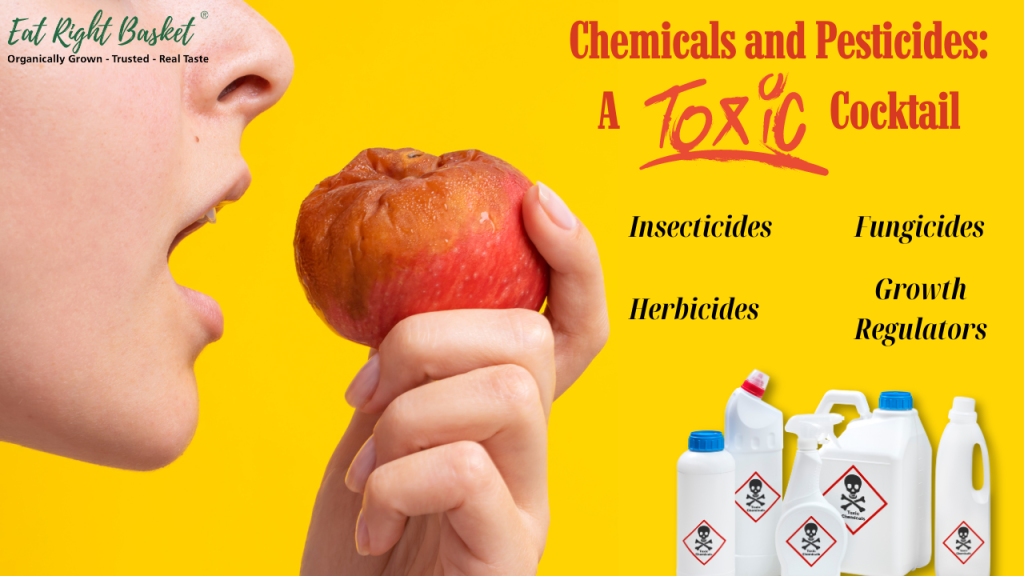The famous saying – “An Apple a day Keeps the Doctor Away” – does not hold true anymore.
Apples, a staple fruit in many Indian households, conceal a disturbing reality. In the pursuit of producing a shining, well rounded, thick skinned perfect Apple, orchards have resorted to heavy chemical and pesticide use in apple farming, Mindless of the fact that it is causing a health hazard to humans, environment and all living beings dependant on the orchard ecosystem.
Chemicals and Pesticides: A Toxic Cocktail
Commercial apple farming in India employs:
1. Insecticides: Chlorpyrifos, neonicotinoids, and pyrethroids to combat pests.
2. Fungicides: Chlorothalonil and Captan to prevent disease.
3. Herbicides: Glyphosate and 2,4-D for weed control.
4. Growth regulators: Hormones to enhance growth and color.

Indian research reveals alarming facts:
– ICMR study (2020): 70% of apple samples from Himachal Pradesh, Jammu and Kashmir, and Uttarakhand contained pesticide residues exceeding safe limits.
– CSE report (2019): Indian apples contain higher pesticide residues than global standards.
– IIT-Delhi research (2018): Chlorpyrifos, a commonly used insecticide, contaminates 90% of apple samples.
Health Impacts
Exposure to these chemicals has devastating consequences:
– Cancer risk: Exposure to chlorpyrifos, glyphosate, and 2,4-D increases cancer risk.
– Neurological damage: Chlorpyrifos and neonicotinoids harm brain development and function.
– Reproductive issues: Exposure to pesticides affects fertility and fetal development.
– Environmental harm: Chemical runoff contaminates waterways, harming aquatic life.
The Residue Remains
Apples retain pesticide residues, even after washing:
– FSSAI findings: 55% of apple samples contained pesticide residues.

Choose Healthier Options
Mitigate exposure:
1. Buy organic: Opt for certified organic apples.
2. Local and seasonal: Support local farmers using integrated pest management.
3. Wash thoroughly: Use vinegar or baking soda to remove residues.
4. Peel: Remove skins to reduce pesticide intake. However this trick actually takes away a lot of fibre and minerals that are very useful for our body and digestion.
DEMAND CHANGE Join the movement:
1. Advocate for sustainable agriculture: Support eco-friendly farming practices.
2. Encourage policy reform: Push for stricter pesticide regulations.
3. Educate others: Share the risks associated with chemical-laden apples.
Protect your health and the environment. Choose organic, locally sourced apples and demand a toxic-free future.
Information is sourced from following resources::
– Indian Council of Medical Research (ICMR)
– Centre for Science and Environment (CSE)
– Indian Institute of Technology Delhi (IIT-Delhi)
– Food Safety and Standards Authority of India (FSSAI)
– Environmental Working Group (EWG)
– Pesticide Action Network (PAN)
– USDA Pesticide Data Program
Take action: Share your concerns and promote sustainable agriculture practices!





